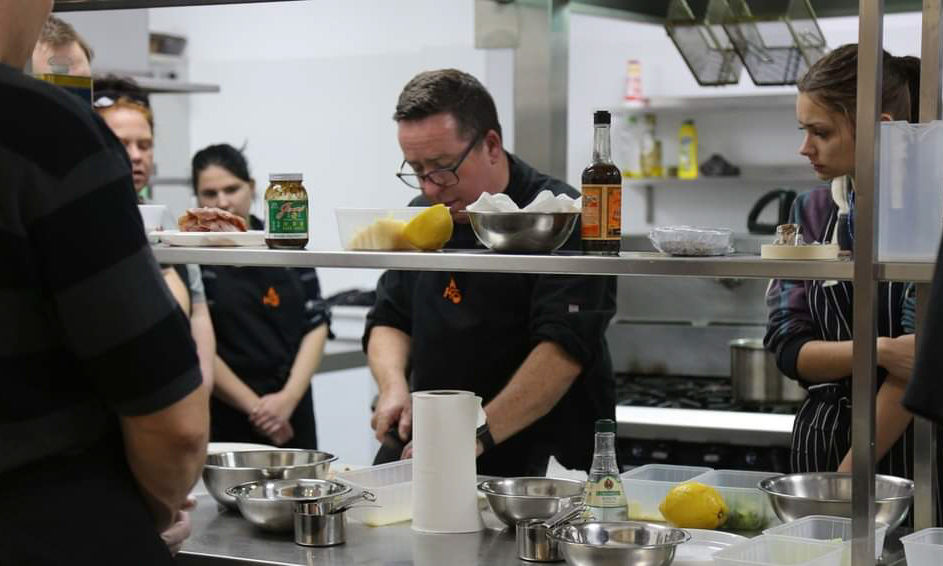Is this an answer to the hospitality crisis?

Well, it could be one of the answers. CityMag talked to the Adelaide Institute of Hospitality about its free commercial cookery and immersion program that equips young people with skills the sector is crying out for.
The general manager of the Adelaide Institute of Hospitality (AIOH), Elizabeth Bell, is well aware of the struggles and reporting of recent closures, mainly attributed to cost pressures.
But she says staff and skills shortages also contribute to these issues and that “there’s also so many places opening”.
“At the end of the day, if you’ve got a really qualified skilled staff, you reduce your staffing,” Elizabeth says.
“I do weddings, you know, I can hold down the floor. I’ve been doing it for years and you just smash it out. Whereas I know if I’m not there, they will have three people on.
“So I feel like when there’s that skills shortage, sometimes the venues are having to put on more people to cover what a high-level experienced person could do, which then increases their wages, which makes it hard with cost-of-living and everything else going on.”
Elizabeth says this skills shortage has been a long-term effect of COVID.
“This is why this skills shortage is really challenging because a lot of people left the industry when COVID happened — they looked at different opportunities,” she tells CityMag.
“We’ve got this younger generation coming in now, but we need to get their skill level up so that we can actually fill that gap.”
You might like
Investing in training young people is what Elizabeth explains as a “long-term plan” and is a strategy that, she believes, can help businesses move through the hospitality crisis.
“It’s one of those Catch-22s where unfortunately businesses need to invest in training now because if they don’t, the problem’s just going to become worse,” Elizabeth says.
“Even though things might be tight, bringing in those people and investing in them to get this training done now, so that they have that leadership back and those right people in the right management positions to then train next year will really help them long-term financially.
“You’re not going to find that person straightaway to reduce your staffing, but if they can invest in the training now for the right people in the right positions, it will reduce their outgoings for wages in the future is how I would look at it.”

To help with this, the AIOH — a registered training organisation — is offering a free commercial cookery and immersion program supported by state funding until April 15. It’s designed to teach potential hospitality workers the tricks of the trade, and a chance to open their eyes to what a career in hospitality may look like.
“We have done heaps of different projects in the past where generally participants will come in and maybe do accredited training… or we try and bring them in and put them straight into an apprenticeship,” Elizabeth explains.
“What we found is it’s a really big step to go from potentially participants who are maybe unemployed, and they’re at home, to go from one extreme to the next.
“With this immersion program, basically, they get to come in, and they spend a whole week with one of our trainers where they get to immerse in industry.
“They go out to venues, and they talk to the head chefs, they look at what they’re cooking. The venues have been really great — they’ve been actually getting them on hands-on prep but without the pressure of service or customers.”
Subscribe for updates
These different experiences range from talking to suppliers and producers, and training in kitchen. There are vendors like Barossa Valley Chocolate Company and the Adelaide Central Markets.
Elizabeth says this is a “really good introduction” designed for young people when entering into the hospitality industry, but admits the program doesn’t “sugar coat” the role.
“We just wanted to give them a really good taste of what it’s like being on your feet and working in a kitchen by talking to people in the industry,” she says.
“You know, it’s long hours, but talking to these people in industry and hearing why they find it rewarding and why they do it.”

“It works both sides of it — so for the ones that watch MasterChef and cook one dish and [think] ‘that’s exciting’ and they get to enjoy life and it’s all fun,” Elizabeth says.
“I think it’s good for those ones that do get thrown into the apprenticeship [afterwards]… to avoid those ones potentially not lasting but also to try and capture some that aren’t sure really what hospitality is about.
“I think a lot of people think hospitality is just restaurants, pubs, cafes… [but] they can work in childcare centres, they can work in aged care homes, smaller cafes, canteens.
“There’s a lot of venues that are running Monday to Friday with really good hours now. So I think it’s to broaden the aspect of hospitality.”
Elizabeth says once the candidates have completed the program she sends them out to employers.
“If [our employers] are taking people off the street, they’re spending that time investing, in the training, or the interviewing, or the recruiting,” Elizabeth says.
“By joining this project, our trainers are doing all the vetting, and the recruiting, spending time with them, making sure they really want to do it.
“Then they mentor them and support them while they’re introduced into the employer. We’re hoping that [will] facilitate that long-term goal of long-term employment.”
To register an interest in the commercial cookery and immersion program, call AIOH at 08 8338 1492 or email [email protected].





